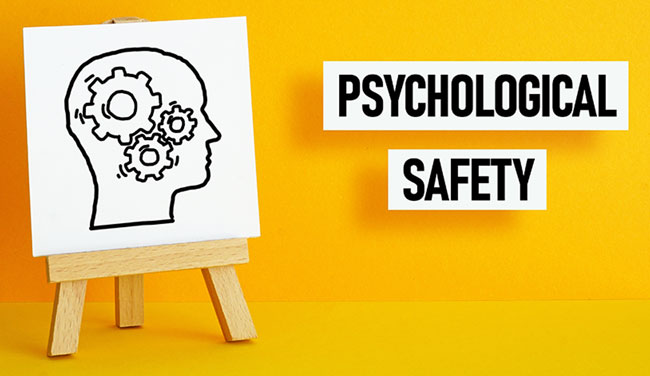15th July 2025

Psychological safety seems to be a hashtag in many posts at the moment. So much so, it risks becoming a buzzword – when it should be anything but!
That’s why we asked Rob Clarke, Director at Elev8, to explain all…
Quite simply, it’s not about wrapping people in cotton wool… It’s about creating the kind of team climate where challenge is welcome, mistakes are learning moments, and the quietest voices still get heard.
Every business talks about innovation, collaboration, and ‘bringing your whole self to work’… but if your people don’t feel safe to speak up, then it becomes corporate waffle without substance. Simply put – it won’t happen.
Why? Psychological safety is the belief that you can speak up, mess up, and show up as yourself, without fear of being judged, ignored, or punished.
It doesn’t, or shouldn’t, mean your team lacks ‘edge’ or teeth when needed. But it is about making it safe to challenge, question, admit mistakes and learn.
The nuance is important: trust is individual, but psychological safety is collective. You might trust your manager but still stay silent in a group.
You might share feedback with one colleague but keep your head down with another. Safety is about how the team behaves and responds.
“Where we get lost is in thinking where the culture begins. We often think it happens in the employee handbook or from the CEO’s office. It doesn’t happen in the employee handbook. It’s in the cubicle next to you and in your own cubicle.” – Bozoma Saint John, Chief Marketing Officer of Netflix.
Warm and fluffy HR idea? No! It’s a performance driver. Pure and simple. If you care about having a high-performing business, you should care about this foundational aspect of team effectiveness.
When people feel safe:
Safety is the oil in the engine. Without it? Things seize up. With it? You get smoother, higher performance – even when the pressure builds.
“Running a business with unhealthy and unhappy employees is like trying to drive a car with a bad engine. It may eventually get you where you want to go, but the trip will be difficult, and you’ll waste a lot of time and resources.” – Sheana Abrahams, Health & Wellness Head of GetSmarter
So, how can you spot if psychological safety is missing in your contact centre? Here are some key warning signs to look out for:
You see more authenticity in WhatsApp groups than in meetings. That’s a sign that the real conversation is happening elsewhere.
When decision-making sits solely within the ivory tower, empowerment evaporates. If people feel their input doesn’t matter, they stop giving it.
A few voices dominate airtime and focus. Others shrink and fade into obscurity. If the same names keep coming up as ‘the go-to’, something’s off.
Leaders give feedback but rarely ask for it. Team members rarely challenge one another. No back-and-forth? No positive disruption? No safety!
If every meeting feels like a test, people will play safe. You’ll get updates, not insight. Agreement, not ideas.
Ask Yourself: Which of these do I recognize? Would my team agree with me? And do they feel safe to say so?
So, what do you do about it if your team are lacking a sense of psychological safety?
Here are some steps you can take, broken down into three pragmatic behavioural buckets:
Say “I don’t know” more often. It signals that not knowing is OK.
Celebrate small wins and learning, not just the results and outcomes.
Use “Tell me more…” instead of “Why did you…” Avoid leading the witness!
For advice on successfully using open questions, read our article: Open Questions to Use in Customer Service
Before offering feedback, check yourself: Am I here to help, or to fix?
Also, think about your questioning – is it a question, or are you REALLY offering an opinion wrapped differently?
Look for those who stay quiet. Create space, invite them in.
Notice who gets cut off or talked over. Step in if needed.
Are suggestions explored or batted away?
You may even notice that certain employees may be causing issues. For advice on managing these, read our article: How to Identify and Manage Toxic Employees
Ask your team what it’s like to be led by you. Then listen.
Explicitly say (and then demonstrate through your actions), “It’s OK to disagree with me. Here’s why that matters.”
Regularly ask the team “Are we creating an environment where people feel heard, respected, and safe to speak up?”
Be curious to understand their answers and collaborate on fixing issues.
Watch the video below to hear Rob Clarke explain what leaders can do to create psychological safety in contact centres:
Psychological safety isn’t built in a team away day. It’s built in the messy moments:
Safety is created when leaders pause, breathe, and choose empathy over ego. It’s strengthened every time we prioritize learning over blame, and people over process.
Assuming you’re a leader reading this, you set the tone. Your words, your reactions, your presence – they create the climate your team operates in. They form part of the shadow you cast, and the legacy you build every day.
“There’s no question that workplace wellness is worth it. The only question is whether you’re going to do it today or tomorrow.” – Warren Buffet
If you want people to bring their ideas, effort, and energy – create a space where it’s safe to do so!
Start by asking yourself (then your team) this question:
“What’s one thing I could change this week to make it easier for people to speak up around me?”
…Then really listen to what comes back – it might surprise you!
Written by: Rob Clarke, Director at Elev8
For more advice and information on supporting your contact centre staff, read these articles next:
Reviewed by: Jo Robinson